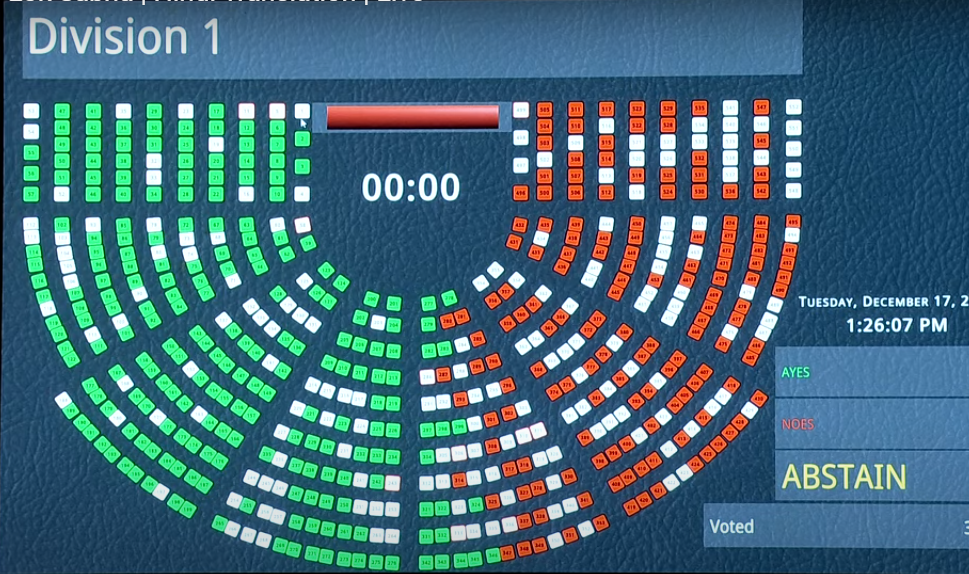On December 17, 2024, the Lok Sabha witnessed a significant legislative development with the introduction of the Constitution (One Hundred and Twenty-Ninth Amendment) Bill, 2024, commonly referred to as the ‘One Nation One Election’ Bill. This bill aims to synchronize elections for the Lok Sabha and state assemblies across India, proposing a unified electoral process nationwide.
Union Law Minister Arjun Ram Meghwal presented the bill in the Lok Sabha, emphasizing the government’s commitment to electoral reforms intended to streamline the election process and reduce the frequency of elections in the country. The proposal suggests conducting simultaneous elections to enhance governance efficiency and reduce administrative expenditures.
‘One Nation, One Election’ bill introduced in Lok Sabha, to be sent to JPC for discussion
Read @ANI Story | https://t.co/oinK0ylJM2#JPC #OneNationOneElectionBill #WinterSession2024 pic.twitter.com/xuZZEyYQuU
— ANI Digital (@ani_digital) December 17, 2024
Parliamentary Proceedings and Voting Outcome
The introduction of the bill was met with a request for a division of votes by opposition members, leading to a recorded vote. The outcome was 269 MPs in favor and 198 against the bill, marking a pivotal moment in India’s legislative history. This session also marked the first use of electronic voting in the new Parliament House, symbolizing a step towards modernizing parliamentary procedures.
Opposition’s Response and Concerns
The bill’s introduction sparked vigorous debates, with opposition parties expressing concerns over its implications. Congress MP Manish Tewari criticized the bill, suggesting it undermines the Constitution’s basic structure doctrine and exceeds the legislative competence of the House. Similarly, Samajwadi Party MP Dharmendra Yadav labeled the bill an attempt to usher in ‘dictatorship,’ arguing it contradicts the democratic ethos of the nation. Trinamool Congress MP Kalyan Banerjee contended that the bill is not a genuine electoral reform but rather an endeavor to fulfill a specific agenda, potentially disrupting the federal balance.
Breaking ‼️
One Nation One Election Bill failed to gain 2/3 support in the Parliament, that’s the power of democracy. Had there been no EVM this Govt wouldn’t have seen the light of day.#OneNationOneElectionBill pic.twitter.com/cPfShHcN4f
— Priyamwada (@PriaINC) December 17, 2024
Provisions of the One Nation One Election Bill
The bill outlines several key provisions aimed at implementing simultaneous elections:
- Simultaneous Elections: Mandates concurrent elections for the Lok Sabha and all state legislative assemblies to reduce the frequency of elections and associated costs.
- Mid-Term Election Clause: In cases where the Lok Sabha or a state assembly is dissolved prematurely, mid-term elections will be conducted only for the remainder of the original term, ensuring alignment with the synchronized election cycle.
- Amendments to Existing Laws: Proposes amendments to the Government of Union Territories Act, 1963, the Government of National Capital Territory of Delhi Act, 1991, and the Jammu and Kashmir Reorganisation Act, 2019, to facilitate the implementation of simultaneous elections across all regions.
Implications for India’s Electoral Landscape
The ‘One Nation One Election’ initiative has far-reaching implications for India’s democratic framework:
- Governance Efficiency: Proponents argue that simultaneous elections will lead to more consistent policy implementation and reduce the disruption caused by frequent election cycles.
- Cost Reduction: A unified electoral process is expected to significantly cut down the expenses incurred during separate elections at different times.
- Federal Concerns: Critics fear that this move may undermine the autonomy of state governments and disrupt the federal structure by centralizing electoral processes.
- Voter Engagement: There are apprehensions regarding the potential impact on voter behavior and whether simultaneous elections might overwhelm the electorate, affecting the quality of democratic participation.
Historical Context and Previous Discussions
The concept of simultaneous elections is not new in India. The country conducted concurrent elections for the Lok Sabha and state assemblies until 1967. However, due to various political developments, this practice was discontinued. In recent years, the idea has resurfaced, with discussions highlighting both the potential benefits and challenges associated with its implementation.
Next Steps and Legislative Process
Following its introduction, the bill is expected to be referred to a joint committee of both Houses for detailed examination. This committee will scrutinize the bill’s provisions, consider inputs from various stakeholders, and possibly suggest amendments before it is presented for final approval. The legislative process will involve rigorous debates and discussions, reflecting the diverse perspectives within India’s parliamentary system.
Public Discourse and Expert Opinions
The ‘One Nation One Election’ proposal has elicited a wide range of opinions from political analysts, constitutional experts, and the general public:
- Supporters argue that it will lead to political stability, reduce the burden on administrative machinery, and allow governments to focus more on governance rather than perpetual electioneering.
- Opponents caution against the potential risks to federalism, the logistical challenges of conducting nationwide simultaneous elections, and the possibility of marginalizing regional issues in favor of national narratives.
The introduction of the ‘One Nation One Election’ Bill in the Lok Sabha marks a significant milestone in India’s ongoing discourse on electoral reforms. As the bill undergoes further scrutiny and debate, it will be essential to balance the objectives of administrative efficiency and cost-effectiveness with the foundational principles of federalism and democratic representation that underpin the Indian political system.
Frequently Asked Questions
What is the ‘One Nation One Election’ Bill?
The ‘One Nation One Election’ Bill is a proposed constitutional amendment aiming to synchronize elections for the Lok Sabha and state legislative assemblies across India, thereby conducting them simultaneously.
Why was the bill introduced?
The government introduced the bill to streamline the electoral process, reduce the frequency and cost of elections, and enhance governance efficiency by minimizing the disruptions caused by repeated election cycles.
What was the outcome of the vote in the Lok Sabha?
The bill was introduced in the Lok Sabha with 269 MPs voting in favor and 198

